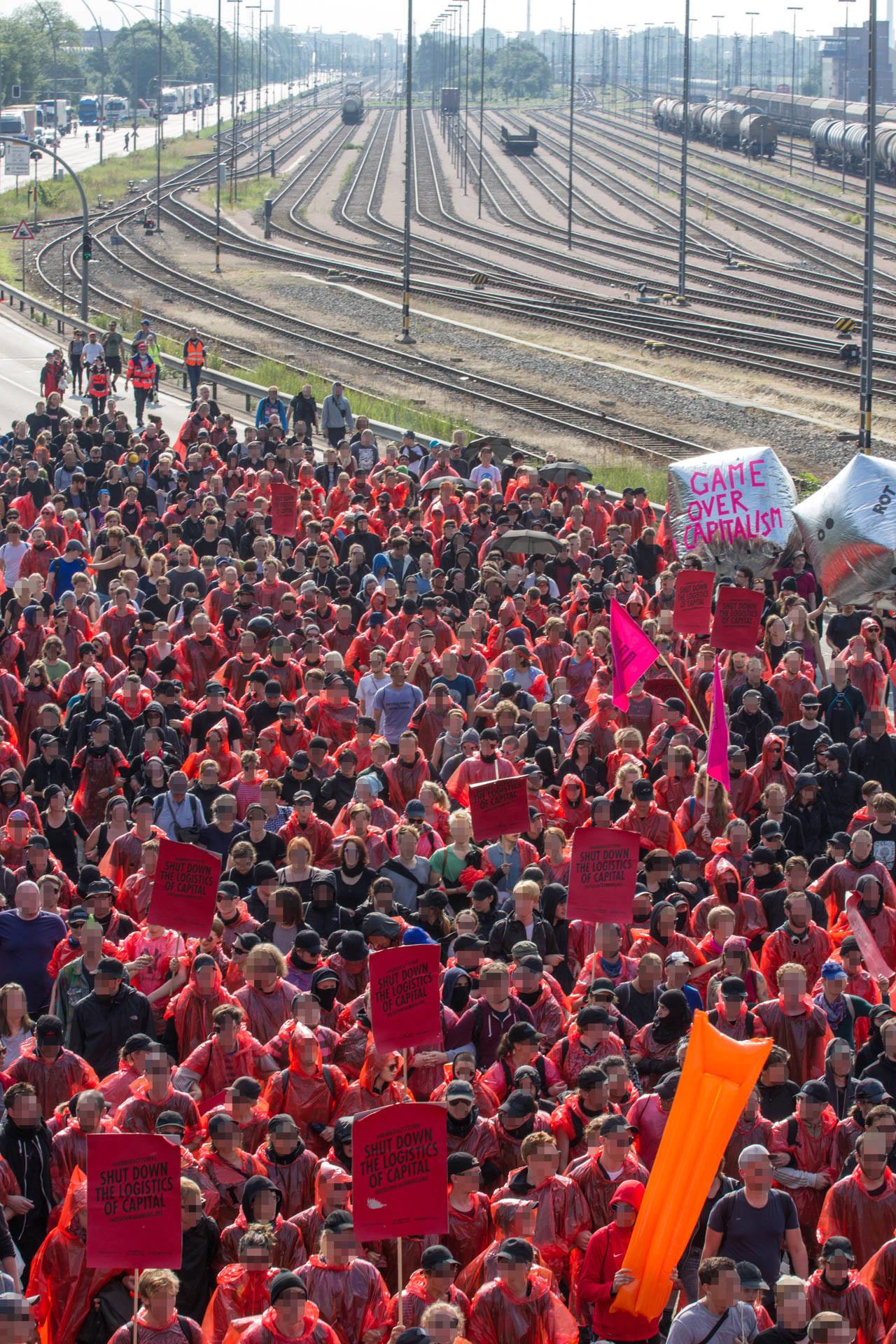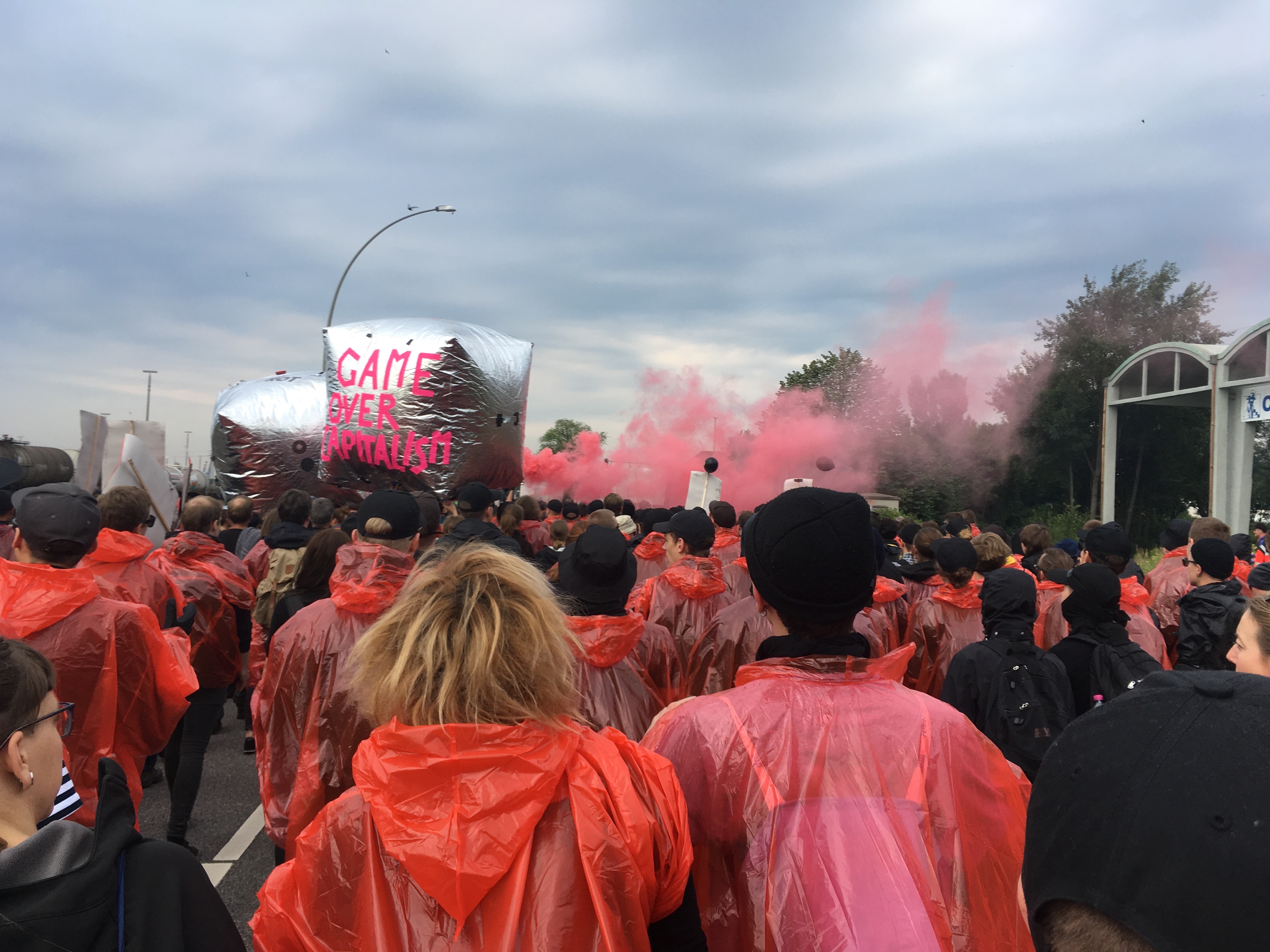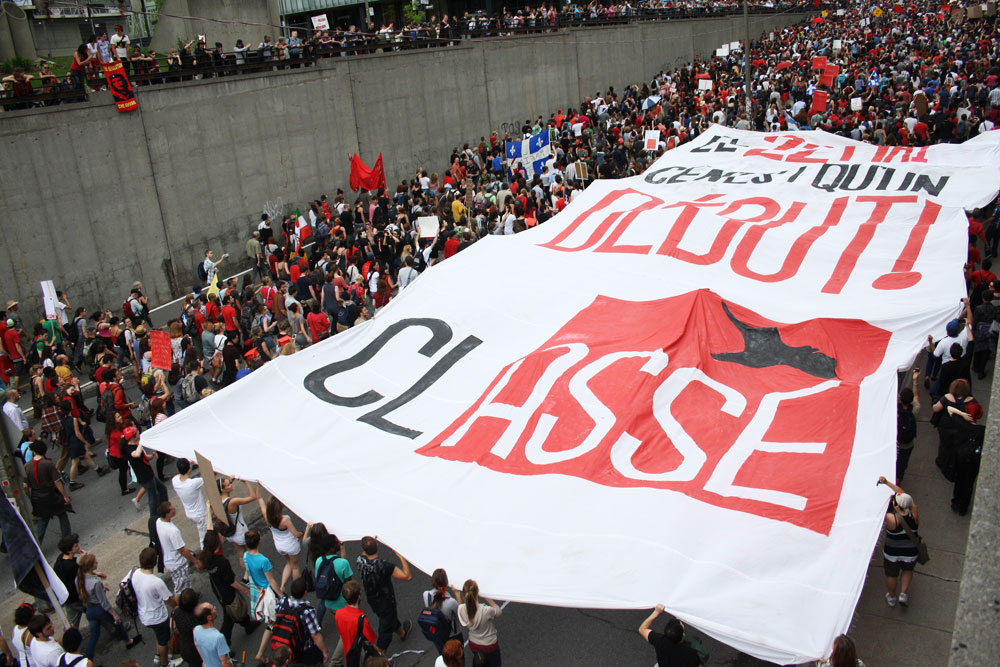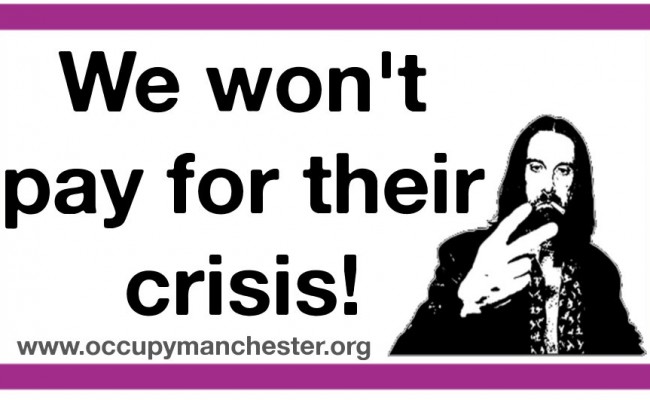This article is a different version of a piece published in Vice, and written by a member of Plan C who attended the G20 summit protests.
It’s 2am on Saturday morning and in the heart of St. Pauli, a district of Hamburg known for its celebration of counter-culture, the atmosphere crackles with tension. Through the haze of tear gas, police special-forces aim loaded rifles to intimidate the crowds into dispersing. Warning shots have already been fired by the police who, backed by water-cannons and military vehicles – stalk the neighbourhood in their thousands, brutally confronting anyone left on the streets.
This response to the demonstrations surrounding the G20 summit was described by one German organiser as a “level of police violence not seen in Europe for 30 years”. Yet, despite the ferocity of the police aggression, demonstrators were successful in enacting Europe’s first “City Strike” – revealing not just the power of collective action, but the possibility of an alternative to the corporate agenda of the G20 summit.
By 4am St Pauli looks like a war zone, as helicopters thud over a tapestry of smouldering barricades, glistening on streets paved only in sand and broken glass. While the riot has dominated international media coverage, the intensifying militarisation of Hamburg in the days before the summit has largely evaded scrutiny. In an alarming collapse of democratic control, a week prior to the G20 the police illegally ignored the decision of Germany’s highest court to allow demonstrators to establish a camp in the city. On Monday July 3rd, hundreds of riot police stormed the camp at night with batons and pepper spray, hospitalising several demonstrators and setting the tone for the days to come.
With over 15,000 police officers deployed to enforce an astonishing 34 sq km exclusion zone around the city-centre summit venues, residents frequently complained of increasing harassment. By Tuesday 4th even small gatherings around sound-systems were attacked with water cannons. By Thursday 6th the police repression escalated further, and a peaceful demonstration was savagely attacked after moving just 300 meters, triggering mass-panic as gangs of riot police beat through the crowd. Bleeding demonstrators scrambled over three-meter walls amidst volleys of batons and pepper-spray to escape the crush. Scores of people were hospitalised – many with broken limbs. Finally, by Friday 7th, hundreds of police dominated every street, provoking and randomly attacking the crowds. Unsurprisingly, by this point the chant of Tout le monde déteste la Police (the whole world hates the police) was proving exceptionally popular. By nightfall the police attacks escalated, finally detonating the volatile situation into an intense confrontation.

Since it was established by George Bush following the 2008 financial crash, the G20 summit has become the central forum for crisis management by Western governments; freezing out the United Nations to emerge as one of the preeminent players on the global economic stage. Advocating policies sculpted by a huge network of corporate lobbyists, the G20’s pro-business agenda and exclusion of civil society groups has led to widespread criticism that interests of wealthy investors are prioritised over basic human rights.
Whilst the Hamburg summit claims to promote “responsibility, economic security and viability”, an investigation by the International Monetary Fund suggests the “structural reforms” on offer will include reducing wages, welfare provision and food subsidies in over 130 countries. Despite raging inequality and rampant environmental damage – so severe scientists now warn that the “Earth’s sixth major extinction event” has already started – the G20’s championing of corporate interests ensures that instead of meaningful changes, the decades of neoliberal economics at the centre of our demonstrably failing system are being extended and accelerated. No wonder even the mild-mannered broadsheets of Der Spiegel damned the summit as “farce”, asserting: “one can understand the wrath with which demonstrators are protesting […] the group meeting here is an exclusive club mostly interested in preserving a creaking system of financial market-driven capitalism.”
The latest strategy of the G20 has two main elements: allowing money and corporate interests to move more freely, reducing the ability of different nation states legally bind an international entity to local laws; as well as, imposing punitive treaty obligations and conditions on a country’s market access which prevent democratic control by populations over resource allocation. Put simply: globalisation makes it increasingly difficult for you and I to change the economy.
So, how can we influence who is in power when globalised markets, free of state intervention, are running ‘normally’? The answer of the Hamburg City Strike is simple: power is logistic, blockade everything.
If normal market conditions depend upon the physical transfer of goods, then central to globalisation is the shipping container; enabling rapid global logistics networks so efficient it’s now cheaper to ship products from China than drive them home from the shop. As famously demonstrated by Margret Thatcher’s destruction of trade unions, logistics are vital to the neoliberal project; allowing corporations to circumvent political struggles – such as demands for higher wages – by relocating factories offshore. Whereas once governments would plan the direction of economic development, now the high-speed movement of logistics acts as a command and control system – so important to the world economy that the Financial Times uses shipping volumes to warn of impending crisis. As such, any blockage in the logistical network rapidly causes severe and expensive disruption; if the Port of Felixstowe were to shut for just three days, it’s thought many of Britain’s factories would be forced to close. With logistical processing increasingly concentrated in large centres, the potential for blockades to exert political leverage is huge.

At 7am on Friday, the crowd flowing out of the S-Bahn station began hastily donning ponchos, transforming into a sea of hundreds of red bodies surging towards the Port of Hamburg. The police – completely taken by surprise – called for reinforcements, but it was too late! From multiple locations thousands descended on specific ‘pinch points’, chanting a simple slogan: “Everything for Everyone!”. Soon every major road and rail-route out of the port was blockaded, leaving a stream of brightly emblazoned shipping containers to stack up in traffic-jams over a mile long. For six hours nothing moved in or out: the Port of Hamburg was shut-down in a disruption costing millions.
The demonstrators carried giant inflatable Tetris cubes reading “Game Over Capitalism”. If logistical blockades become part of a pan-European strategy, they may be right. Indeed, the actions’ organisers – Ums Ganze and Beyond Europe – see the blockades as a test run, proving that “if we tighten the right screws and break the right circuits, we can show how vulnerable this complex system is”.
And the blockades didn’t just occur at the port, they followed the logistical trail to its logical destination: the city itself – where the circulation of imported goods finally realises its value. Heeding a call to skive-off work and join the City Strike – a philosophy of action centred on withdrawing labour from the workplace to disrupt critical infrastructure – thousands of demonstrators formed blockades across Hamburg. As students and their professors raced out of the universities to join the resistance in the streets, swarms of highly mobile pickets flooded the roads around the airport; creating havoc for arriving delegates. Meanwhile outside the summit venues, throngs of people clutching umbrellas faced down water cannons to besiege key access routes into the exclusion zone – disbanding under police attack only to spontaneously re-emerge at another intersection. The tactic proved highly successful; delaying the summit by several hours, preventing key attendees reaching the venues and even trapping Melania Trump inside her hotel – eventually forcing the military to extract world leaders by helicopter.
Despite calling in reinforcements from across Germany, Austria, Denmark and Switzerland, backed up by over 50 high-tech water cannons, attempts to silence the demonstrations categorically failed. Across the Friday and Saturday, large parts of Hamburg would become police-free zones; as hundreds of decentralised actions combined into a collective articulation of power capable of defending territory across the city. Whilst the televised violence of the riots appears unsavoury, perhaps the words of Berlin poet Bertolt Brecht may offer some clarity: “What is robbing a bank in comparison to forming a bank?”
If logistics enables corporations to evade both governments and political opposition by rendering the traditional strike largely redundant in western workplaces, the Hamburg City Strike suggests that new tactics appearing across Europe are beginning to synthesise into coherent strategy to combat these defeats. If previous demonstrations against neoliberal globalisation have focused on the summit themselves, then Hamburg represents a qualitatively new mode of action, which responds to how the nature of political power has changed in its logistical, economic and territorial forms.



